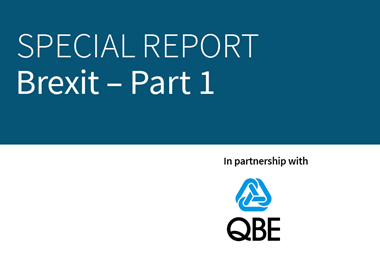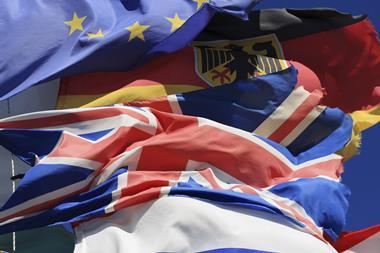The prospect of the UK leaving the European Union represents the biggest risk to business this year

The referendum to decide Britain’s future in the European Union takes place in less than three months and the result is incredibly difficult to predict.
Opinion polls put those wanting the UK to stay in the EU – the “Remain” campaign – several points ahead but can pollsters be trusted for predictive accuracy?
Certainly the reputations of the majority took a battering last year after calling so spectacularly wrong the outcome of the UK General Election.
Earlier this week, the financial media giant Bloomberg ran an article about Brexit poll predictions under the headline “All ‘Brexit’ Polls Are Wrong But Some Are More Wrong Than Others”.
Of course, we will only know the real answer to that once the votes cast are counted after June 23.
Perhaps a better way of predicting the outcome might be to look at the combined betting prices, where “Remain” is the odds-on favourite. Bookmakers owe their living to getting these types of prediction correct more often than not.
None of this means anything though – unless you have wagered a few pounds/euros on the result. Or the future of your business.
The only thing that really matters is the final vote count and nothing is as yet certain.
So, while it might look likely that the UK electorate will vote to continue to be part of the EU, there are plenty of factors that can still influence the outcome in the opposite direction.
One thing the polls broadly agree on is that the result will be relatively close.
When British Prime Minister David Cameron announced in 2013 his government’s plans to hold a referendum on Britain’s EU membership, there seemed little doubt at that time that the “Remain” campaign would secure a comfortable majority with at least two-thirds of votes cast, if not significantly more.
While it may sometimes seem to outsiders that Britain is naturally Euro-sceptic with an “islander” mentality, on the whole most Britons have been relatively comfortable with its EU membership for the best part of the 40 years it has been in what was once called the Common Market.
The fact that the UK was never part of the troubled euro zone has shielded it from the most damaging aspects of the recent financial crisis.
There has, of course been frustration at some of the bureaucracy emanating from Brussels, but this is not a view unique to Britain and that is often conveniently forgotten or ignored.
However, so much has changed over the last four years since Cameron announced the referendum that a comfortable majority is no longer guaranteed.
Indeed, it might well be argued that June 23 not only determines Britain’s future in the EU but could also have an impact on the future of the EU itself.
Europe is going through its most turbulent period for more than 80 years – economically, politically and socially – along with almost everything in between.
Many countries, particularly its southern states, continue to struggle with the debt legacy of the euro zone crisis which started a decade ago.
It is not a little ironic that some of these nations, such as Greece and Italy, are struggling to cope with the most acute effects of Europe’s most challenging and damaging problem – migration.
A union meant to foster harmony is on the verge of cracking up with some of its most fundamental pillars, such as freedom of movement, at the very centre of the argument.
Walls and barbed wire fences are springing up as self-interest starts to dominate.
The massive and unprecedented movement of people into Europe from war-torn Syria and across North Africa as a consequence of the so-called Arab Spring has brought this crisis to a head.
Some of the decisions made by individual European governments have been incoherent at best and positively schizophrenic at worst – welcoming and then shutting out the migrants.
The EU itself has spent most of the last six months trying to stop this growing tide of humanity. Whether or not the latest agreement involving sending migrants back to Turkey actually works remains to be seen.
For many, however, the damage has already been done, and even some of Europe’s most traditionally tolerant and welcoming countries, such as Sweden, are in despair.
Add to this, the significantly increased terrorist activity we have seen since the start of 2015, and there are genuine concerns about the security of Europe.
Rightly or wrongly this toxic brew plays into the hands of those who want Britain to leave Europe and it is for these reasons that the outcome of the UK’s referendum remains so unclear.
Outside the UK and around the world, we are seeing a movement away from the traditional political establishment and elites. Witness the remarkable rise of Donald Trump in the US and the growth of more “extreme” political groups throughout Europe.
With voters revolting, risk managers and the businesses they represent should ignore the Brexit scenario at their peril.
While some companies have been planning around this for several years, there is evidence that others have been adopting a wait-and-see policy confident that should the UK leave the EU there will be plenty of time to deal with the consequential risks.
They might be right but some risks – such as stock market and currency volatility – are likely to be immediate.
Such complacency is likely to catch out the unwary and it is for this reason that risk professionals not only in the UK but also elsewhere in Europe and beyond, prepare for the unthinkable before it is too late.
And if the UK leaves Europe, where does that leave the EU itself? Some analysts argue that it would be undermined to the point of implosion.
Brexit might seem irrational but then so, for many, does the idea of a Donald Trump presidency. That does not mean it won’t or cannot happen.
But as voting is down to a public not always easily swayed by the opinions of business, rational or otherwise, we might be facing the reality of both very soon.
By Mike Jones, editor-in-chief at StrategicRISK




















No comments yet